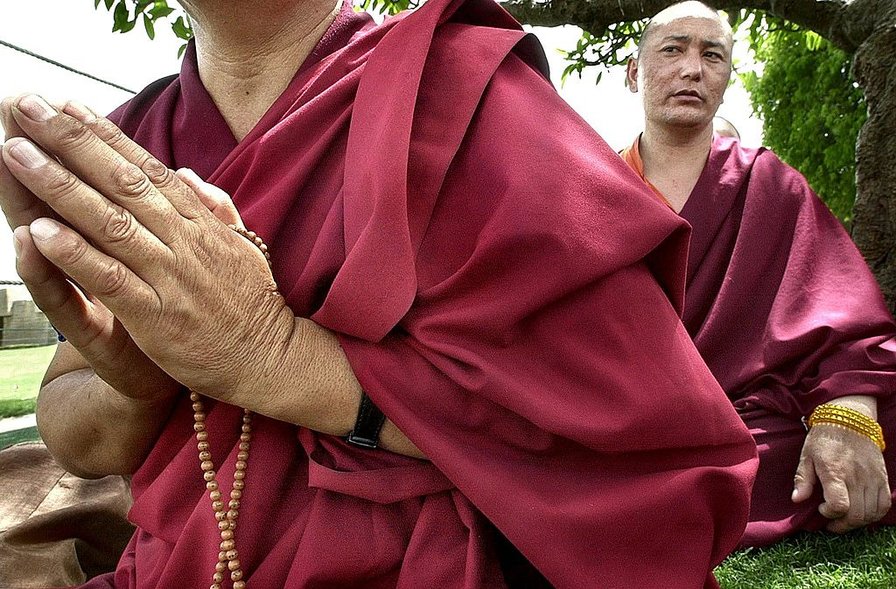
Monks from the Himalayan Committee for Action on Tibet pray in New Delhi, 25 April 2002 for the 13th birthday of the Panchen Lama Gedhun Choeki Nyima, the ‘lost’ boy picked by the Dalai Lama as the second highest figure in Tibetan Buddhism. (Photo: Philip
Many people are deeply invested in what happens when they die.
Entire religions are constructed around theories of the afterlife. Christianity and Islam promise special places to go to while Buddhism prescribes breaking free from the hamster wheel of existence to leave the cycle of death and birth. Is any of this actually possible?Stephen Batchelor is skeptical. In Confessions of a Buddhist Atheist the former monk points out that the Buddha avoided discussing body-mind dualism, which the notion of rebirth relies on, while refusing to speculate on metaphysics. The religion that formed after his death injected this rebirth problem into its theology despite the Buddha’s insistence that it is not a meaningful question.
Batchelor cites many Buddhist thinkers that make rebirth the foundation of Buddhism. For example, the sixth/seventh century Indian philosopher Dharmakīrti was a dualist who insisted the mind is immaterial and nothing material, such as a body, could give rise to cognition. When Batchelor expressed his skepticism—Dharmakīrti never mentions the brain because he had no access to fMRI technology—his teacher promised that the student would realize truth through meditation.
Thus the “proof” of rebirth rested on a subjective experience of a non-physical entity in a non-ordinary state of awareness. If you lack such an experience yourself, then you have to trust the word of meditators more accomplished than oneself.
Which is the same reason the Buddha left his two yoga teachers; he would not take their word for what he had to figure out for himself. When he did come to a conclusion it had nothing to do with the afterlife and everything with recognizing illusions we suffer during this lifetime. Batchelor compares this sort of blind faith with Christians mystics “knowing” God and people claiming to have been abducted by aliens. There’s no way to test their claims.
Anecdotes run into trouble because today we can measure consciousness. While we might not have discovered a mechanism that turns consciousness on (most consider it an emergent phenomenon) we do know it shuts off when the body dies. No body, no mind—no dualism.
Which is the topic of Michael Shermer’s forthcoming book, Heavens to Earth: The Scientific Search for the Afterlife, Immortality, and Utopia. In a recent column the Skeptic magazine founder lists three reasons “you” won’t survive past death.
Your memory cannot be restored
Transmigration relies on the notion that “you” are a collection of memories that survives intact. But that’s not how memory works. Every time you recall a memory it has changed from the original experience. Whatever has happened since has influenced your retelling of that moment. We are not static animals; we’re fluid processes continually remembering the past differently dependent upon the situation….
The post Three Reasons “You” Won’t Return After This Life appeared first on FeedBox.